Citizen Journalism Part 1: The Key To Achieving A Moksha State of Panarchism
They say that history repeats itself, but why is that?
And does it have to be that way?
One of the biggest problems that we continue to deal with as a species is the view of history and human progress as linear, rather than cyclical.
Or to put it in another way: We often think that the modern issues we face today are new and unique – and of course in many ways they are – yet for the most part they are the exact same issues that humans have been dealing with for thousands of years, just with a new twist on them.
As a result, we continue to repeat the same old mistakes over and over again.
Nearly the entire history of human civilization can be summed up by this simple and seemingly never-ending cycle:
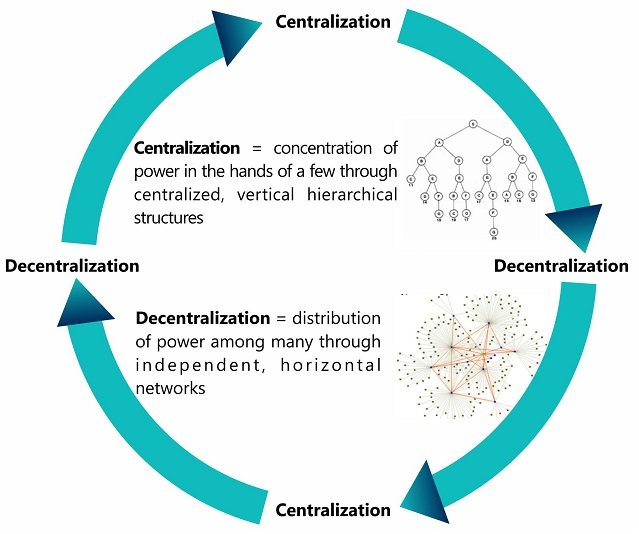
"It was never about capitalism vs communism - it was always about centralized
vs decentralized. Both capitalism and communism have decentralized voluntaryism
as their promised endgames, but both ideals corrupt in practice to centralized rent-
seeking and use of lethal force. Thus, society was never so much about ideal
distribution of resources, as it was about the centralized use of force vs a decentralized
voluntary trade and resilience to such force. The Internet and blockchain technology
is the best promise of decentralized resilience we've had in 500 years."
-Rick Falkvinge
To break it down further, here’s what the cycle of human civilization looks like in even more detailed stages...
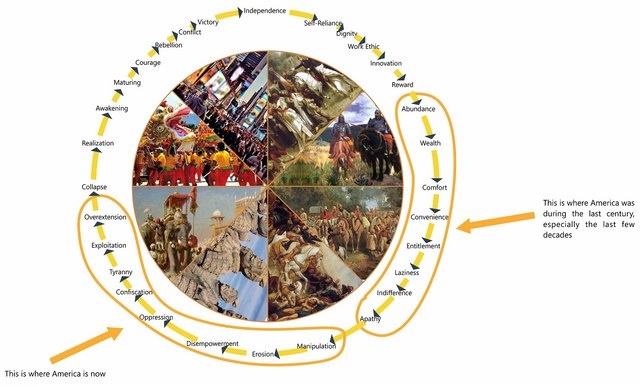
If you study the history of nearly every empire, society and civilization, the majority of them repeat this exact same pattern/cycle in some variation or another.
It is a never-ending struggle between those with power and those without power that repeats itself over and over and over and over and over and over and over and over and over and over and over and over again.
When you really dig down into the root causes of why this cycle keeps repeating itself, it essentially comes down to this:
Those In Power Are Relentless In Their Pursuit Of More Power.
They Never Rest.
The Average Person On The Other Hand, Is NOT Relentless In
Their Vigilance AGAINST Power And Corruption.
Those in power have a much greater economic incentive (ROI) to gain more power… while those without power have much less economic incentive to constantly monitor these uber-Type A dominating individuals and keep them in check.
"The real damage is done by those millions who want to 'survive.' The honest men who just want to be left in peace. Those who don’t want their little lives disturbed by anything bigger than themselves. Those with no sides and no causes. Those who won’t take measure of their own strength, for fear of antagonizing their own weakness. Those who don’t like to make waves—or enemies. Those for whom freedom, honour, truth, and principles are only literature. Those who live small, mate small, die small. It’s the reductionist approach to life: if you keep it small, you’ll keep it under control. If you don’t make any noise, the bogeyman won’t find you. But it’s all an illusion.”
-Sophie Scholl
“The world will not be destroyed by those who do evil, but by those who watch them without doing anything.”
-Albert Einstein
Prosperity and material abundance almost always breed apathy, laziness, and indifference… and as a result… massive corruption. Many people are aware of this but they don’t want to actually have to DO anything about it. They just want to go about living their normal lives. It’s only once things get really, really, REALLY bad that enough people finally get fed up with the corruption and begin to mobilize and organize to do something about it. This is the point that we are beginning to reach in the United States now.
Eventually if things get bad enough, it leads to mass protests, civil disobedience, civil unrest and if things get really bad, maybe even revolution (not always violent, but sometimes it is).
Then, if the revolution is successful, some of the ruling class may be tried and punished, the system of government is restructured, reforms are made, everyone feels good, society feels like it’s getting a fresh start, people are optimistic again about the future…
And then people breathe a big sigh of relief and say “Oh good, now we can finally go back to living our normal lives again.”
Then within a few generations all of the problems and corruption and struggles are forgotten, apathy sets in, and the whole process starts over again.
You can see this exact attitude right before our very eyes during this 2016 election.
Almost every time I read a political thread on Facebook there's usually someone who says something along the lines of...
"I can't wait until this whole election is over and we can all go back to normal again!”
Put aside your feelings about elections and the political process. The point is, most people don’t want to be bothered with this kind of stuff on a regular basis.
I’ve been spending a lot of time the past couple years thinking about how to permanently break this cycle.
The more you study history, you can’t help but think...
Is It Even Possible To Break This Cycle?
Or is this just the natural order of things? Sometimes I wonder.
This cycle of Centralization --> Decentralization --> Centralization seems to be just as natural as the life and death cycles of nature and the seasons.
Summer (Life) --> Fall (Decay) --> Winter (Death) --> Spring (Rebirth)
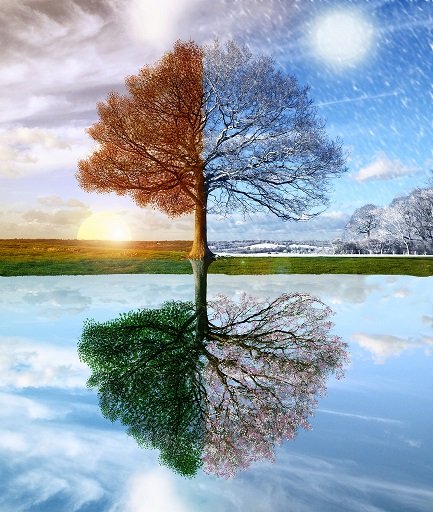
Even if a true stateless society was achieved, the kind that anarchists are striving for, and all governments were dissolved...
Would a percentage of power-hungry psychopaths find a way to instigate conflict as a way to manufacture fear and manipulation so that they can divide and conquer and thus create the demand for the protection of state sanctioned violence all over again?
Maybe.
Probably.
Which is why I really have my doubts about whether a true state of anarchism could ever be achieved and maintained. Personally, I feel like panarchy is a much more realistic and attainable goal and we are already moving in that direction (which could then eventually lead to universal voluntaryism down the road). But citizen journalism – the point of this article series – is something that I think almost everyone who wants to change the current system should be able to agree on regardless of what their end goal is.
Maybe the cycle CAN be permanently broken. I want to believe it can.
In Hinduism They Teach A Concept Called Moksha,
Which Means Freedom Or Liberation From The
Cycle Of Death And Rebirth. The End Of Suffering.
That Is EXACTLY What We Are Striving For In
Our Struggle Against Centralized Power
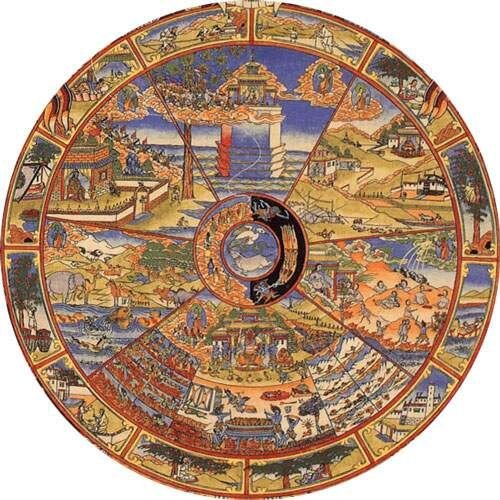
This Hindu concept of Moksha actually fits perfectly with panarchism because panarchism is often referred to as a framework of nature’s rules that is used for observing complex adaptive systems – which is what things like economies and nation states are, they are a complex system of biological organisms that together, form an ecology.
The essential focus of panarchism is balancing the interplay between change and persistence... between the predictable and unpredictable… order and chaos… stability and instability… status quo and adaptation.
This balance point is often called the edge of chaos… The edge of chaos is the constantly shifting battle zone between stagnation and anarchy.
To come full circle to the opening of this article by rewording it a different way: The edge of chaos is the constantly shifting battle zone between centralization and decentralization.
Decentralization = revolt, change, chaos, anarchy, growth, adaptation
Centralization = remember, stagnation, predictable, order, status quo
The smaller, faster, nested levels invent, experiment and test, while the larger, slower levels stabilize and conserve accumulated memory of system dynamics.
A healthy complex ecological system needs both.
Change and Stability.
Yin and Yang.
Duality.
Panarchy attempts to resolve this dichotomy.
It offers a model that describes evolving networks and hierarchical systems with multiple interrelated elements. Panarchy is the structure in which systems, including those of nature (e.g., forests) and of humans (e.g., capitalism), are interlinked in continual adaptive cycles of growth, accumulation, restructuring, and renewal.
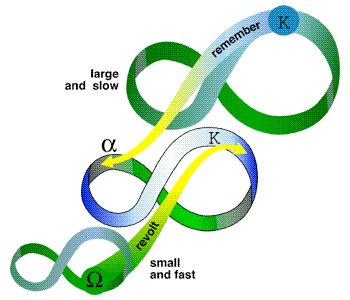
The question is, can we have governance without government?
Rules without Rulers?
Order without closed system rule-by-secrecy hierarchies that hoard resources and breed corruption?
Evidence already suggests that we are now operating in a global ecological system in which natural selection is beginning to select networks in favor of hierarchies.
The cumulative effect of these networks and overlapping spheres of social governance is forming a complex adaptive system of anarchical open source web of connections that has an erosive effect on the centralized power and authority of both state and corporate hierarchies.
Leveraging these networks constitutes a new source of power that is highly fluid and functions independently of state power, which can help us move towards social governance without government.
But much more will be needed.
Enormous changes in cultural thinking will be required – the distribution of human intelligence, changes in the way we feel and associate with each other, higher levels of consciousness and awareness, emotional intelligence, empathy, counter-economics, agorism, self-ownership, self-leadership, self-empowerment, self-responsibility, self-development, self-governance, self-awareness, self-love and love for others all have to become permanent ways of life.
But in my opinion, even that is not enough.
Even more than that, an eternal vigilance against parasitical forms of power (both in the public and private sectors) needs to become a permanent way of life.
I think citizen journalism may be one of the keys to achieving this state of Moksha, maintaining that balance on the edge of chaos.
It can’t just be something that people do when things get really bad and they get fed up with the establishment. It can’t just be something people do sporadically on the side when there’s a big election or scandal.
Watching Out For And Exposing Corruption And Abuse Of Power Needs
To Be Something That Is So Permanently Embedded Into People’s Minds
That It Becomes As Natural And Just As Much A Part Of Everyday Life As
Eating, Drinking And Sleeping.
“There is a perpetual struggle between ‘freedom’ and ‘authority’; neither one of which will ever be annihilated. It appears, indeed, that we are left with a politics of perpetual protest. There cannot be any point at which those dedicated to liberty can sit back in security and assume the world is in peace, harmony and freedom… Even if anarchy were to be achieved, eternal vigilance would be the bare minimum price for a modicum of success… There is no final battle. The battle is forever.”
-Harold Barclay
-------------------------------
If you want to connect with me more, the best way to do so right now is through Facebook:
https://www.facebook.com/isaiah.sieg